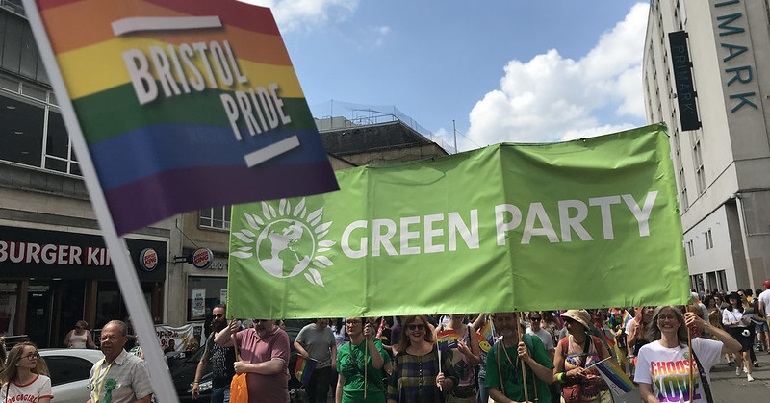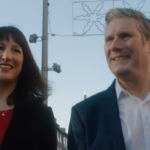The Green Party’s future lies in a transformative, participatory programme of the left

There have been lots of different responses to the general election writ large. Mired in defeat and punch-drunk with the loss of ostensibly safe seats, the Labour Party recriminations have begun. Various narratives have emerged, each seeking both to explain the defeat and vindicate the approaches of various different factions. Some on the party’s left are claiming Brexit polarisation is individually sufficient as an explanation. Rather predictably, the Blue Labour faction and their allies are recommending a return to reactionary positions on social issues, seemingly unaware that such narratives put us all in this mess in the first place. The rest of the party’s right are simply loading the blame onto Jeremy Corbyn and his allies in the hope that they can rid themselves of the stink of defeat. All signs point to a grim leadership fight in the New Year, and a fight for the party’s future direction, with frequent interventions from an overwhelmingly hostile media.
The Liberal Democrats also have decisions to make. They gambled on a hard remain position, and trusted Brexit polarisation to hand them huge numbers of seats – which failed to materialise. The Unite to Remain alliance, conceived in this spirit and shamefully supported by the Greens and Plaid Cymru, was shown to be a dead rubber. The loyalties of remain-backing Tory voters were steadfast, and leftwing remainers’ contempt for the Liberal Democrats did not seem to diminish. The Liberals have a choice to make: which head of the chimera will now do the talking for a party whose basic political commitments beyond EU membership have become hazy at best?
For each party, the existential question – what are we for? – is set to be answered briefly and brutally over the coming months.
The Green position
All of which makes the Green position in England and Wales peculiar indeed. No seats were gained, while the vote share increased slightly. Neither triumphant nor routed, the Green party faces no electoral imperative to overhaul leadership or approach.
And yet, as Chris Jarvis wrote last week, the election campaign was in a number of respects disastrous. The Unite to Remain concept was deeply opportunistic, and reinforced a simplistic polarisation along Brexit lines that could never assemble a winning left coalition. It detracted from the message that this was a climate election – our most powerful selling point reduced to a secondary issue. The intense focus on marginal tactical gains encouraged weird sniping at Labour from rightwing angles, such as Molly Scott Cato’s musings that compared union backing to corporate backing. Jonathan Bartley made an islamophobic comment on radio and TV twice, before making a twitter apology that didn’t face up to why and how the comments were islamophobic in the first place. Most of all, all this helped to confuse Green messaging and demoralise activists, not least the younger generation of school strikers who looked to us for clear representation.
There are, then, clear moral and political imperatives to break from this performance and take a good look at what we’ve been doing. Not only that, however, but the constellation of political forces around which our election messaging was built is disintegrating rapidly. As other parties reconsider their options, we cannot use the political cover of an increased vote share to avoid doing the same.
So what next?
As the achievements of Labour’s left come under threat, and are erroneously blamed for the Tory victory on Thursday, it is vital that Greens take this as an opportunity to support the groups most threatened by such developments. The rights of migrants, people of colour, the LGBTIQA+ community, and many others are liable to be jettisoned if the Labour right gains currency. This means building on the fantastic progressive policy that the Green Party offered at this election – such as abolishing the Home Office, self-ID for trans people, and more – to show unflinching solidarity. No less crucially, it means dealing forthrightly with any examples of racism in our own ranks, acknowledging them and resolving to do better.
Likewise, we need to take this opportunity to stand by the boldest policy stances that we share with the Labour Party. As some of Labour’s most radical proposals – expanded public ownership, workers’ wealth funds, the Green New Deal – come under attack from hostile media and an emboldened right, we must stand resolutely by these policies. We must demonstrate that the future lies with a transformative left programme, one that we will continue to promote on the merits.
But most of all, we must show that we have the tools, the means, and the intention of leading a transformative programme that can win hearts and minds. As Adam Ramsay has written for openDemocracy, ostensibly transformative economic models are popular on their merits, but in order to capture the imagination they must appeal directly to the deep disaffection many feel at the existing system of government. Building common wealth must mean bringing power closer to the people and building common institutions they can believe in. Greens must make an unwavering case for deeper and more expansive democracy at all levels.
It wouldn’t be the first time. We have long recognised the state’s repeated and systematic failure to respond to the people. Recently, Caroline Lucas’ Dear Leavers project represents a rare, true attempt to dig beneath the Brexit divide and discover the untapped consensus underlying our differences: a common experience of disempowerment, and a desire to rectify it.
It is on this vibrant, participatory basis that we should strive to build a working understanding with allies – Labour’s Left, even sympathetic left-liberals – and build a popular cause that’s worthy of the name.
With these steps, we can reinforce the best in our respective traditions and build a broad front to resist Tory dominance. Anything else is likely to be insufficient, and this work must begin now.
Winning this struggle requires us to be our very best – so let’s get to work.
PS. We hope you enjoyed this article. Bright Green has got big plans for the future to publish many more articles like this. You can help make that happen. Please donate to Bright Green now.




As soon as you make a claim to be “of the left” you cut yourself off from millions of potential members and voters.
Why not just set out a stall under the heading “Rational and evidence based policy, and sustainable living.”?
It’s easier to drift to the left than to leap there. If Labour had been savvy enough to have embraced PR decades ago instead of messing about with its usual enthusiasm for a power grab and a great leap leftwards via a fptp system that’s manifestly undemocratic, Britain would be a much more gentle, kind and sophisticated modern social democracy now.
Instead of which… well, look around you at who’s in absolute charge, on the back of 43% of the popular vote, screaming in our faces that democracy’s the real winner.
As soon as the Greens say “we’re of the left” we’ll lose support.
Let’s just say we’re enthusiasts for rational, evidence based policies. And if people suddenly twig that’s a kind of leftist approach, say “well, looks like some leftist approaches are rational. Who knew?”
“Blair had to take Labour to the centre to have any success at all”. This is a common misperception. After Thatcher and the Poll Tax, and Major with the mess of rail privatisation there was a huge popular vote for Labour from people who wanted to see the end of neo liberal politics (as it is now seen).
Blair however had a different agenda, along with many of those Labour MPs. He moved the party strongly to the Right. Thatcher said Blair was her biggest success.
Many labour voters ceased to trust the party. They flocked back in thousands when Corbyn was elected leader.
This country had enough appetite for Socialism to keep the Welfare State since WW2 but the media have presented the socialism that exists across most of Europe as some kind of Stalinist nightmare so those who don’t study these things are led by the nose into a dystopian future.
I think we we didn’t get a second MP simply because though our policies are in my view right they are not necessarily popular enough yet!.Couple that with the claim at every election by Labour and even green members that a vote for Green is almost equivalent to a vote for the Torys. This view has been very hard to overcome in someplaces as most who has campaigned have found. There has been real vilification of the Green Party for even daring to stand by Labour supporters. I think there is still a point in some kind of agreement for parties to the left of Torys because it seems likely that Labour will not be able to get a majority of votes on its own and with FPTP the 10% of votes or more that Lib Dems, Greens and Plaid get could get that majority of votes. An agreement seems useless unless Labour is willing to be part of it though. Looks likely to be 5 years to think about it though.
I don’t agree. One of our policies/principles is to work with all parties. Your piece suggests we drop this to give solidarity to Socialism, effectively. The UK is not naturally socialist, it has never done well here – Harold Wilson had a really hard time, Benn never got the votes, Socialism, in my lifetime, has always been too extreme for this country. Whatever class we are the people of this country are basically predominantly ‘righter’ rather than ‘lefter’. Blair had to take Labour to the centre to have any success at all.
The Cons won the election on a tried and tested brilliant strategy, Labour and Lib/Dems lost on really poor strategy. The Greens didn’t get another MP because we couldn’t see the need to portray the integrity of our message either independently or strongly enough.
I observe that our vote grows with the failure of other parties. But, deals with other parties harms us. We won’t build up respect by holding onto other’s coat-tails.
There is a fact out there that there are only 22 countries across the world that England hasn’t invaded. That mentality of power is ashamedly at the Union’s core. This is who the UK is more often than not. Which is why we never fully cooperate.
Our existing policies on social justice integrated with environmental justice is stand alone. Already, The Greens are credited with having understood and informed the country of the Climate and Biodiversity Crises. We must build on that as we get closer to the need for Adaptation practicalities. We are getting stronger at district council levels, are being recognised for preparatory adaptive work and must carry on working with other parties, in local councils.
But, at the next GE we must have good competent strategic thinking for our own policies and principles. We must not attach ourselves to Labour or Lib/Dems next time. Our voice was too watered-down by doing so. So let’s stand independently strong, and add fizz next GE.
Totally agree. But for this to work we need to, partially and in some places, ditch ttw. There is simply not enough capacity of within the party to both focus directly on electoral prospects while also working on building a grassroots case for fundamental transformation.